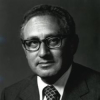Henry A. Kissinger

Henry A. Kissinger
Henry Alfred Kissingeris an American diplomat and political scientist. He served as National Security Advisor and later concurrently as United States Secretary of State in the administrations of presidents Richard Nixon and Gerald Ford. For his actions negotiating the ceasefire in Vietnam, Kissinger received the 1973 Nobel Peace Prize under controversial circumstances, with two members of the committee resigning in protest. Kissinger later sought, unsuccessfully, to return the prize. After his term, his advice has been sought by world leaders...
NationalityGerman
ProfessionStatesman
Date of Birth27 May 1923
CountryGermany
The China of the 1970s was a communist dictatorship. The China of the twenty-first century is a one-party state without a firm ideological foundation, more similar to Mexico under the PRI than Russia under Stalin. But the measurement of the political and the economic evolution has not yet been completed, and is one of the weak points of the system.
More and more of the Taiwanese economy is connected with the mainland. There are more and more exchanges taking place. There's no reason to doubt that over a period of ten years or so, or maybe more, the conditions of life on the two sides of the Taiwan Strait will become more comparable, and the dialogue on the political level therefore easier.
I don't think that that's a desirable option for us. Besides, it wouldn't work, because there are too many other countries that are willing to work economically with China. But I don't think the basic relationship depends on economics. It depends on a political understanding of what is required for peace in Asia.
The nuclear weapons were not useful for the achievement of political objectives.
I don't have a brief for every single reaction of Israel, but I think it is important that the political negotiations occur free of the threat of terrorism.
An Iranian moderate is one who has run out of ammunition.
In the middle '50s, I had written that the point would come, inevitably, at which the relationship between the cause of conflict and political objectives would be lost.
Create the impression of endless willingness to compromise and you almost invite deadlines. That's the challenge we now have in North Korea and have had in North Korea for 10 years. In this sense, diplomacy and foreign policy and other elements of political activity have to be closely linked and have to be understood by the negotiators
The illegal we do immediately. The unconstitutional takes a little longer.
I also do not believe that the United States can let itself be driven into a political role by escalating terrorism, and therefore, the leaders of the Arab world and Arafat should do their utmost to put an end to this and then the United States should do its utmost to produce a political solution.
The public life of every political figure is a continual struggle to rescue an element of choice from the pressure of circumstance.
Power is the great aphrodisiac.
Peace depends ultimately not on political arrangements but on the conscience of mankind.
Ninety percent of the politicians give the other ten percent a bad reputation.